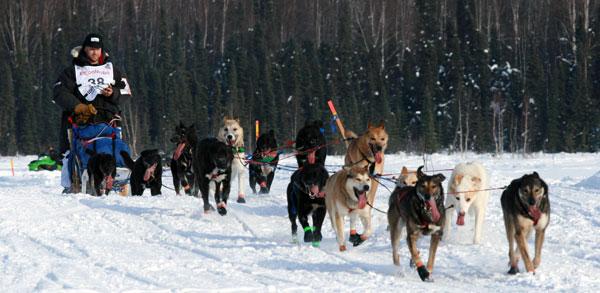
As Iditarod teams spread out on the trail, lead dogs will start to prove themselves. It’s up to mushers to make sure their leaders remain healthy at the front of the team. As KUAC’s Emily Schwing reports, that’s no small feat.
The wind picked up along the Takotna River as Aaron Peck blew through the checkpoint. Peck is coming off a 24 hour rest in McGrath. He’s pleased with his lead dogs.
“They’re both three years old, so they’re just entering their prime and loving the trip,” Peck said.
But dogs are tricky. Brent Sass had to drop two of his main leaders back in Rainy Pass. Now, he’s thinking of other ways to run his team.
“When you don’t have your main dogs, especially those that can run on the coast, it can be challenging for them, so try everybody up there, switch ‘em around and see who does best in what conditions,” Sass said.
Dropping a leader in Takotna or Ophir may be in the cards for Mike Williams, Jr. of Bethel.
“I don’t want to drop him. If I carry him now and try him out after that rest, he’ll have a little over 30 hours and maybe he can make it to Nome,” he said.
The young veteran says he’s not ready to make any major decisions. But major decisions were made for Ramey Smyth. He says a vet forced him to leave a very experienced lead dog back in Skwentna.
“His name was Barley, he was a perfect dog, immaculate health. He should be here helping the team. He’s a leader. I’m sure he misses the fact that he’s not here. I miss him,” Smyth said.
It was a move Smyth didn’t agree with. He was still stewing over the incident as he furiously bootied up his dogs in Takotna. He says he’s trying not to let it get to him.
“Yep! Gets you off on the wrong foot. Now, I’m doing great and I’ve got a very positive attitude, but I want official action against those vets,” Smyth said.
Smyth requested an official apology from race veterinarians. He’s also requesting official action from the Race Marshall.
Listen to the full story




